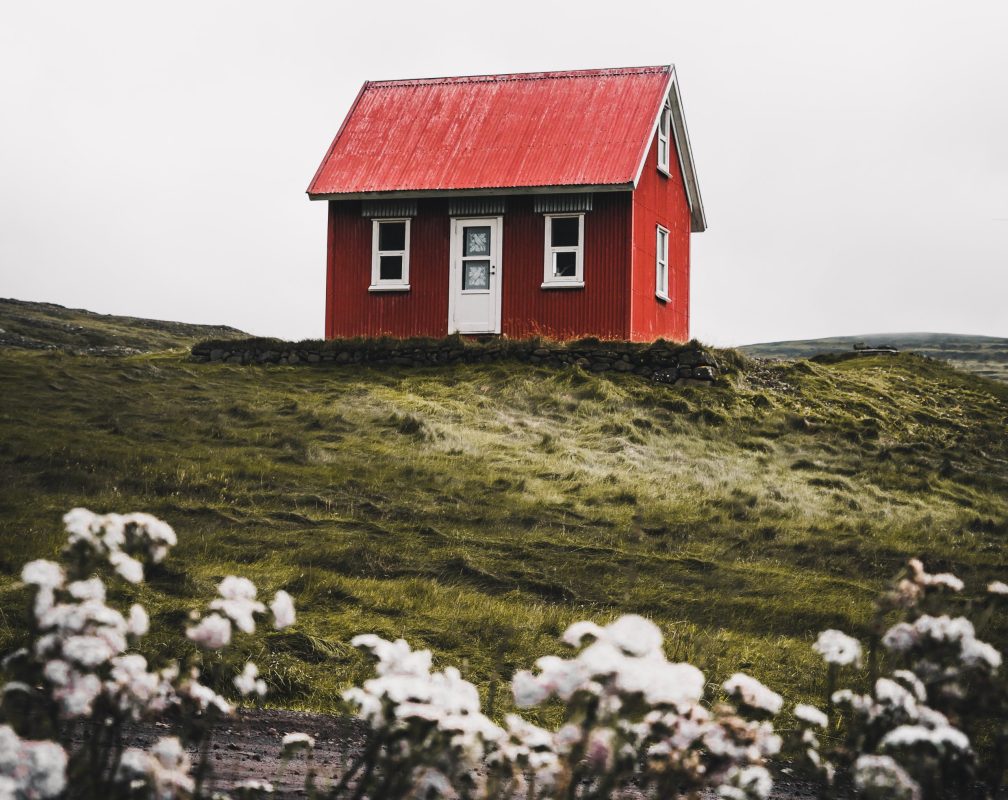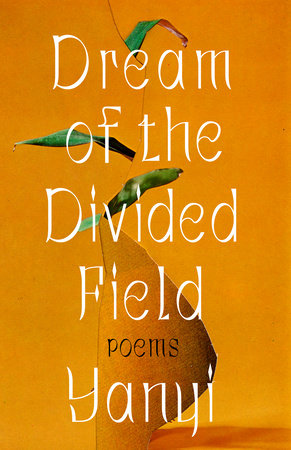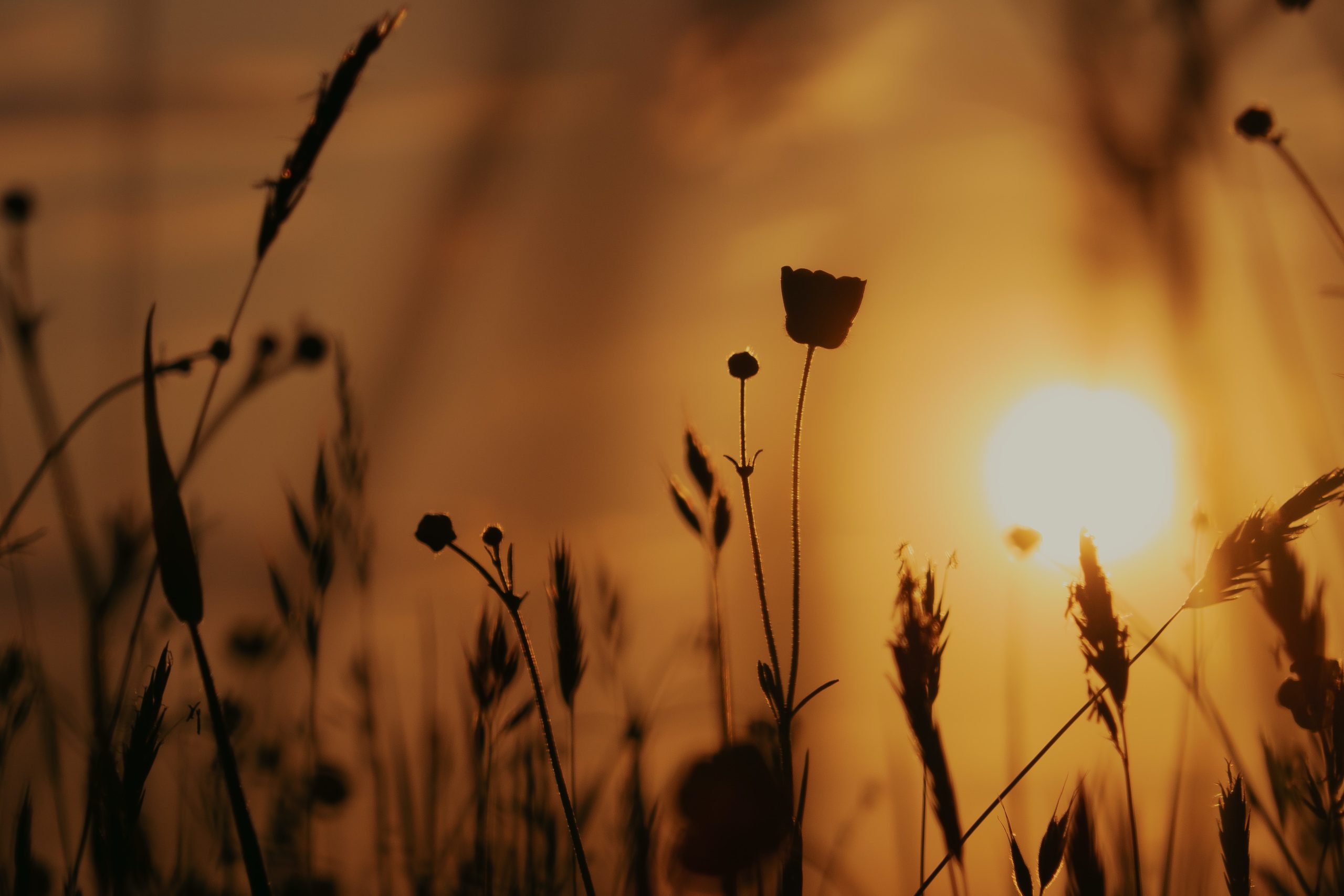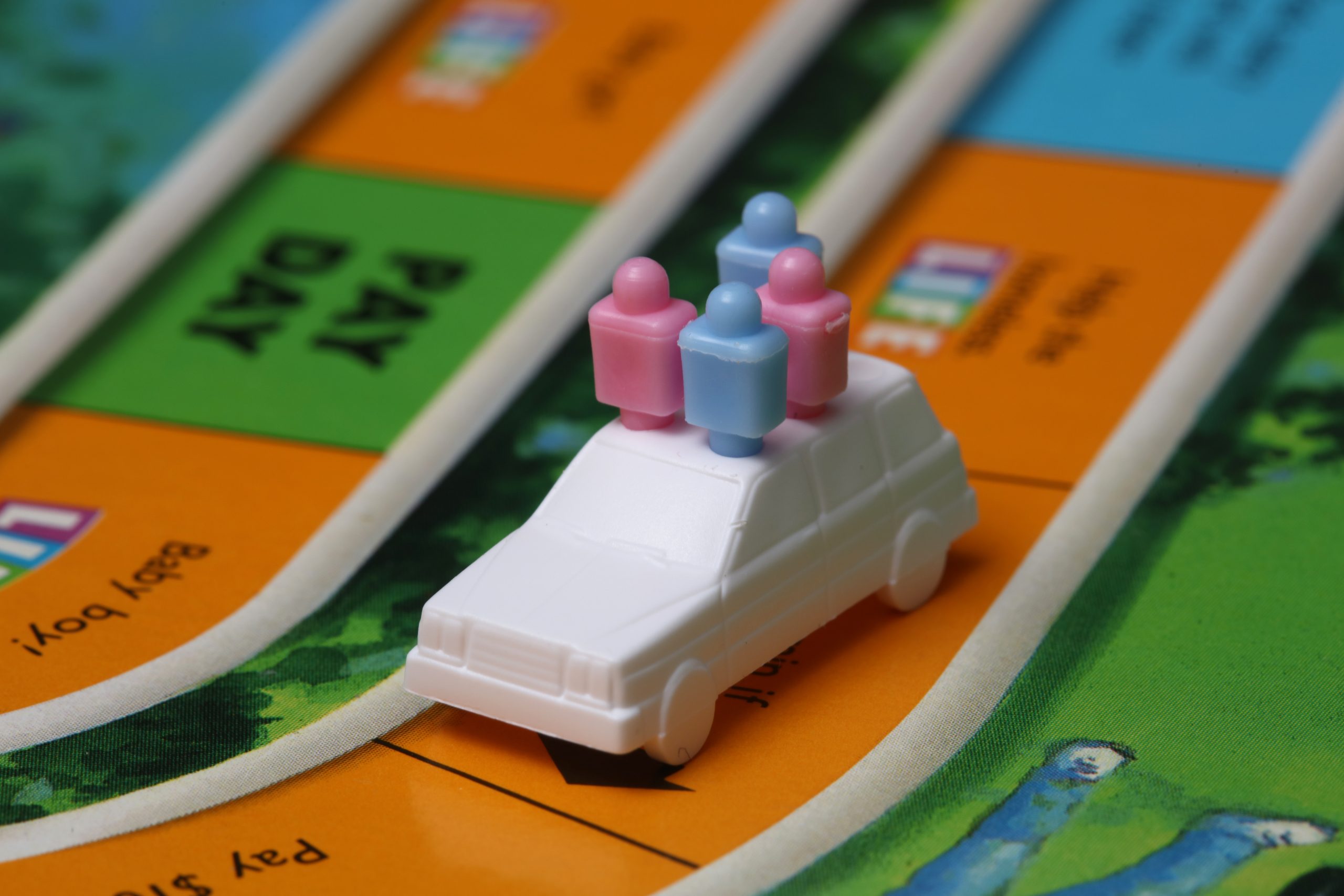interviews
Carrying the Home of Our Past Selves
Yanyi, author of "Dream of the Divided Field," on reconciling past beloveds, past homes, and past lives

Yanyi shows me his SAD lamp within the first two minutes of our interview. He’s somewhere in Vermont and I’m in Brooklyn, and the sky is gray from both our windows. He tries to impart some of his manufactured sunlight to me, via Zoom, so neither of us descends further into a chasm of guilt and existential despair. Sadly, it doesn’t work.
“I feel like I’ve had this thing on for all of winter,” he laughs. It’s 9 a.m. where we are, too early for jokes about the sincere burden of living. Instead, we talk about it reverently and tie it back to art, the way serious artists do.
Yanyi’s poems in Dream of the Divided Field, his second book of poetry, is a broad, existential meditation on the past—specifically, how the past is always present. It’s about life as we’ve lived it, and how that affects the life we’ve yet to live and the people we’ve yet to meet. His works are philosophical and lyrical, personal essay and fiction, and fuse binaries and trinaries together as one unit. In a recent interview with the publisher, Yanyi said that this new book “is about how our past loved ones, past homes, and past lives never leave us. It is about how our lives are necessarily played on top of our other lives—that we don’t escape or leave anything behind. We return, always, in our bodies and dreams.”
With this in mind, his poems should be read not by, but through the body, in order to feel their weight on our own lives. Split into five parts, each section isn’t necessarily categorized thematically. Space is important to Yanyi, and often it’s the gaps on the pages that encourage readers to reflect on their own interpersonal relationships—with lovers, with families, with strangers, and most saliently, with ourselves.
Arya Roshanian: You recently said in another interview: “As I wrote at the beginning of 2019’s The Year Of Blue Water, ‘we carry our homes with us.’ Dream of the Divided Field is my second offering for how.” I was wondering if you could also maybe elaborate on that and how this book is a continuation of that?
Yanyi: I feel like the idea of “we carry our homes with us” is the first prose poem in my first book. And there was a moment when I realized that I was doing really similar things in this book, and still look completely different. There’s this search for “home” we all do. I was talking to someone the other day about when I first moved to New York. There was this formless search of looking for things that would be right for me or feel like home. There was a lot of “I don’t want to be where I am right now” or “I want to be somewhere else.” And so, in this book, I’m reflecting on the past places where I’ve felt at home.
In my first book, I was writing about things that I was discovering. It was really about the external world, in a way. Whereas Dream of the Divided Field is more introspective. How do I move through the past and actually be in it now that I’m not there and am able to be present with it? I’m reconciling with and releasing myself from the past by entering into it and feeling everything that I did not allow myself to feel when it was actually happening. So there are a lot of things that ended in this book that I did not expect.
I reconsider and think about my transition with my body, and I reconsider this previous relationship that was really, really difficult for me to come to terms with. Facets of it were abusive, and it’s been difficult for me to name it as such. And I think part of that comes from how the story that we talk about abuse is very much modeled by heterosexual and patriarchal dynamics. Queer people have had some interventions with that, like Carmen Maria Machado’s In the Dreamhouse. But anyway, those were all things that I was thinking through.
AR: The past, and our memories of the past, are often, but not always, different. At times, they can be contradictory. How do your past and the past relate to one another, if that makes sense?
[When I first moved to New York], there was this formless search of looking for things that would be right for me or feel like home.
YY: Yeah, I know what you mean. Part of the reason why the book is called Dream of the Divided Field is because I’m really interested in this idea of the illusion of what we perceive of another person, similar to this idea of your past is the past. There’s an objective reality in terms of things that have or haven’t happened, and what those realities really mean. One person can, and will, interpret something or someone differently than I. No matter how objective you try to be, there’s always some level of distortion. It’s almost impossible for there not to be, especially when it concerns interpersonal relationships. And that makes it really difficult to settle on one story. So, part of this book is me working through and coming to terms with that distortion. In a way, you never know what actually happened. Like, was I in an abusive relationship, or was it just a really complicated queer relationship where both of us were traumatized? We don’t have many models for what is right or wrong, at least in my case. I grew up in an immigrant household with parents who don’t really like each other. I put a lot into the idea of falling in love, and thinking it’s going to be absolutely perfect. That’s not really a great way of moving through the world. I feel like we all cope with that, at least in the queer community. As younger queer people, a lot of us moved through the world as our parents did, or didn’t realize that we had more options than what we’re used to doing. It can be difficult, and it can be very unhealthy.
AR: How comprehensive is your past in the collection? Do you feel it covers every part of yourself, or is it narrower than that?
YY: In a way, it’s a very narrow slice. I wasn’t necessarily writing to inform anyone else about what was going on. I was writing through it, and reading through the poems to understand myself. I would say that they’re a representation of what I was thinking about at the time that I was writing them. But I also hold myself permission to not think the same things anymore. The ability to change my mind, or the right to change my mind, is something that I feel very strongly for. In what ways can we love the people who have hurt us? Can we still love them? Are we allowed to? Inevitably, I talk about my parents a bit, insofar as the kind of love that they expected from me, and the kind of love that I was truly willing to give them. Part of reconciling with my past is tied to how I feel about a particular part of my background, without only remembering the really painful or difficult part. This is really a book about being willing to love, believing in love, and trying to love, despite everything else that happened.
AR: I could be totally wrong, but I interpreted the part breaks in the collection as the distinctions between the phases of your life. Can you explain the decision behind these clusters?
I’m reconciling with and releasing myself from the past by entering into it and feeling everything that I did not allow myself to feel when it was actually happening.
YY: When I’m putting together a book, I’m usually thinking about the emotional stream that moves through it, something that can be represented only through a collection of poems. So, in a lot of ways, the form is predetermined by the work that’s already there. Memory is a big part of this book, like moving through my memories, or the point of memories in my own life. But this book also went through quite a few iterations. I’ve tried, for example, placing the poems about family next to the poems about my abusive relationship, and the subsequent grief I felt during the breakup. There was an impulse to interweave the strings a little more than in my first book. But there was also a very distinct difference in the voice. How do these poems, and the space that follows, resonate when I put them in the particular order? I wanted to be clear when I was putting them together in categories.
AR: I think there is also a tendency to want to categorize everything singularly, whether it’s an experience or a mood or a feeling or whatever. Many things occupy many things simultaneously, and we encompass multitudes at once. But disregarding all that, how would you categorize your past in one word?
YY: The first word that comes to mind is “transformative”, actually. And that’s ironic, because the themes between my books have not changed much, and I think that has to do with the fact that, in some ways, I’m still the same person. But transformative is the first word. It’s important for me to learn what stories I’m telling myself, and ones that are being told about myself, and then choosing the story that I’ll take into the future. And that, I think, is transformative.
AR: When you look back at this phase of your life, what word, or words, would you choose?
YY: To be very, very honest, probably “lost” and “confused”. I think that’s how a lot of people feel as well, with the world we’re living in right now. But I don’t think it’s a bad thing to be lost or confused, because there’s always a valley that we have to move through. And I’m trying to take this experience of where I am right as an opportunity to move through the morass. And that’s actually how I know another book is coming—when I’m in this valley, there’s probably something that I don’t understand. The best thing about being a writer is that my uncertainty is prized, rather than looked down upon. We all have to go through the unknown, and that’s exciting to me.
AR: One of the poems has a line that I think about a lot. In “Dream in Which I Try to Disappear in Front of My Aunt, or, Interrogation,” you write: “My father is terrible with details, so I’ve spoken to him with my real voice and my real body.” There’s a lot to unpack here, and more importantly, there’s an existential quality to it as well that I’d love for you to elaborate on.
In what ways can we love the people who have hurt us? Can we still love them? Are we allowed to?
YY: I love that you noticed that in that poem. The thing that I was talking about—or rather, dreaming about—at the time was about how, in a way, my father and I are very similar. We never talk. He expects me to call him, but I don’t call him, because … it’s complicated. But that line is about not being afraid to speak to someone in a way they don’t. They don’t see or can’t perceive the differences that you have, whether you’re trans or changed your outfit or something. I got a tattoo, who knows if my parents know I have a tattoo. I guess they will now.
But I do feel my dad and I are kindred spirits, and are, in a way, artists searching for something more. But we’re so engrossed in our work that we can’t reach or see or be with each other, at least in this life. So, I’m sure I’ll meet him again. But sometimes the nice thing about dreams is that you can meet people in different forms and speak to them in different ways and feel connected to them. I think that literature is one dreamscape that we can enter into, and still talk to the people who we wish we could talk to, or who we no longer can reach in some way. And going back to your point about our past versus the past, I think dreams can very much inform a part of our past. There’s a lot that can be revealed from our subconscious or our memories that we can only perceive through dreams.
AR: As a fiction and nonfiction writer, one thing about poetry I find exciting is that the aural and visual experience can be so different, even contradictory. I’ve read so many poems that were enhanced when they were read aloud by the poet. Through which sense is your preferred way to experience poetry?
YY: It really depends on the person and the ways that you comprehend stuff. I’ve always read quietly to myself, because I had to be a quiet child. My experience of the aural in poetry is very much an internal sense, so when I’m really stuck with a poem that has kind of a more propulsive sound to it, I will say it out loud. I hear things, basically, and then I write them down. There are some poems that I do enjoy reading out loud. I enjoy reading my poems out loud because I’m constantly thinking aurally, even though I’m not reading or composing aloud or composing out loud. And it was really delightful to, I guess, give myself permission to write poems that felt very almost like a cliché, almost, but to do so in a way that’s like candy to me. Sonically, it was delicious. I think even if you’re reading it silently, you can still get that.








